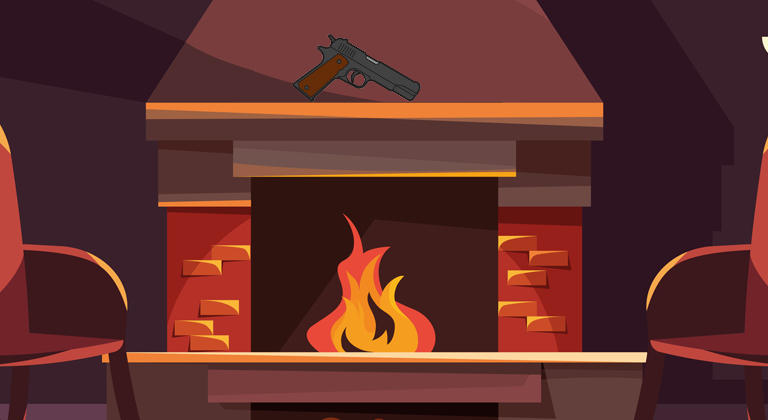Silence Your Inner Perfectionist – Before They Kill Your Book!
Author Ginger is back today with some more advice about the craft of writing – namely, that if you constantly revise and rewrite your book, striving for perfection, you’ll never get it published. Sometimes you have to just make like Elsa and “let it go…” What are your thoughts on the subject? Let us know in the comments below after you read what he has to say about it!
One of the best pieces of life advice I ever received was attributed to the Chief Operating Office of Facebook, Sheryl Sandberg. In her 2013 book Lean In, she argued that women trying to balance personal and professional lives should live by the mantra of ‘done is better than perfect‘ and like many pieces of wisdom, this is one that’s not just relevant to women.
I’ve found it especially powerful in writing – and it’s one of the first pieces of advice I give to people who are struggling to publish their first book. The Goldilocks syndrome – the overwhelming desire to have a book be just right – is especially prevalent among first-time authors because so much of their passion, heart and identity is wrapped up in what they’re writing . Author David Falkirk wrote a fantastic article which peeled back the psychology of this issue and correctly identified it as originating from fear. First time authors struggle with procrastination and writer’s block because they’re unwittingly terrified that if they finish their first book… it might suck.
And the honest truth? It probably will – to you. I still have a copy of the first full-length book I self-published in 2011 – which has the rare distinction of not having sold a single flipping copy – and when I read it I keep thinking about how I’d have done it differently now.
But the problem was, I didn’t know what I know now back then – and the only way I ever learned was by writing and publishing even more books that were also far from perfect. Now I have over a dozen self-published books and the new ones sell enough copies every day to let me know that I must be doing something right; and yet with every new book I publish I still learn more, and it means the subsequent book will be even better. I stopped telling my friends “this one is the best book I’ve written yet” because they remind me that I say it about every book… and yet it’s true!
So, you have to abandon the notion that you’ll keep crafting this one book until it’s ‘perfect’ – because it never will be. You have to get it done. You have to finish it, hit publish, and then start thinking about the next book; because that one (and all the books that follow it) will be slightly less imperfect than the one that came before it; and your writing career will be growing in a way your hypothetical ‘perfect’ book could never have helped accomplish.
To do all this, you have to first understand what exactly is holding up your work, and then figure out how to deal with it.
Meet The Perfectionist
While David Falkirk identified the root cause of a lot of writing procrastination as fear, the culprit is a character I call The Perfectionist. He’s a shadowy figure who lives inside every writer’s head and like all well-rounded characters, he’s not truly good or bad; but is capable of both.
For a veteran writer like myself, The Perfectionist is an embittered, balding man with a ratty suit and a briefcase who comes to work everyday to make sure things are running smoothly. He wants to ensure your plot makes sense, your characters are consistent, your writing style is true to form and you’re putting in a good day’s work when you craft this latest story. He used to have a lot more responsibilities – but like all bureaucrats, a lot of his job has been outsourced now. For instance, I now have an editor to make sure my character’s eye color doesn’t change from one scene to the next, and that typos and errors are corrected prior to publication. And so while The Perfectionist will still check over the paperwork and make sure I’m keeping up with my usual standard, he doesn’t need to fix it all any more.
For more fledgling writers, though, The Perfectionist is a big, burly, cigar-smoking boss-man who micromanages and interferes with every aspect of your day job. He won’t let the product go out the door until it’s perfect – with a style of prose as sublime as Shakespeare, brevity like Hemingway, world-building as good as Tolkien or JK Rowling and an underlying social message as powerful as The Hunger Games. He’ll never let you get the damn thing written because he keeps making you rewrite that first chapter… and then that first paragraph of that chapter… and then the first line. And the next morning you’ll open up your computer and read that first line and The Perfectionist will tell you: “It’s rubbish! Delete it and start again!”
The first thing you need to do as a writer is realize that The Perfectionist – like a lot of bosses – is just too big for his boots. He thinks he’s saving the world or curing cancer by preventing you from finishing an anything-less-than-perfect book; but what he’s really doing is holding the entire process up. You have to realize that you’re the boss of The Perfectionist – not the other way around – and you need to bring him into your office and establish some ground rules.
Overcome The Perfectionist by Getting It Done
Slap The Perfectionist on the wrist and make sure he knows who’s boss.
You do need him – but only bring him in during the production meetings; when you establish what the book is going to be about, who the characters are, and lay out the framework of a plot. Then you tell that big son-of-a-typewriter to go and grab some coffee; because The Perfectionist has no business being involved in the actual process of writing. When you write your first draft, you just want to sit down and write it. You want to get the words on the paper and worry about the details afterward.
This is why events like National Novel Writing Month – NaNoWriMo – are so powerful; because they force you to write 50,000 words in a month, and in order to keep up with your daily word-count goals you don’t have time to worry about self-editing. The Perfectionist is sitting in his office with the door shut, while you’re out on the factory floor making sure the orders are going out. Successful, established writers live like every month is NaNoWriMo because they know the first step to getting a book published is getting it written.
The only time The Perfectionist should be allowed to venture from his office is when you hit a period of writer’s block – which I personally believe to be your mind’s unconscious way of telling you that something is wrong with the fundamentals of the book, or you need to go away and think out the next section a little better. I will normally spend half an hour folding laundry or vacuuming the living room when I have writer’s block so I can do something mindless (yet productive!) while I focus all my mental energy on dissecting the cause of my writing blockage. It’s invariably some detail I’d missed – like a character acting in a way they shouldn’t, or a plot point needing a little massaging to make work – and as soon as I’ve had that ‘eureka’ moment and figured it out, the mental machinery starts churning again.
That’s when you send The Perfectionist back to his office and concentrate on writing again. You want to have written the words The End before you speak to him again; and be sitting in front of a completed first-draft of a manuscript.
If you’re a first time writer, especially, you’ll probably have your hands shaking as you type The End because you’ll be thinking: “Oh my goodness, this is rubbish.” And maybe it is – but it’s done. If you sit down and write a complete book – fiction or non-fiction, 25,000 words or 250,000 words – you have done more than most aspiring writers will every accomplish in their lives. That’s why it’s so important – and why it’s proof positive of the Sandberg mantra of “done is better than perfect.”
Take a Look at the Wreckage
Ernest Hemingway wrote “the first draft of anything is shit” – and the more junior your writing career, the more accurate that is. I’ve written before about how writing is a craft, not an art, and when you are an apprentice craftsman, your first completed effort won’t be as good as those of an experienced professional. Yet, as I write above, you at least have a completed effort, which is more than most aspiring writers ever get to.
The second stage is to review and revise your first draft into something vaguely publishable. This is where you will need to bring The Perfectionist into the picture; but once again, remember who is boss.
When you read your first draft you’ll probably find all sorts of problems; and I’m not just talking about typos, spelling errors or how you described the hero and heroine as starting out as “plutonic” friends (what is this, science fiction?) You’ll probably find entire sections that need to be re-written, scenes that need to be added or removed, and a lot of mess to be cleaned up.
Yet once again, don’t be despondent – think of your manuscript as one of those houses on HGTV. It’s a ‘Fixer Upper’ and while it might need a lot of work, it at least has four walls and a roof.
During this stage, though, The Perfectionist might interfere and overstep his boundaries. You want to revise your book; he tells you to rewrite it. You might wrinkle your brow and think: “This scene works, but I’d originally planned to do it this way” and The Perfectionist will tell you to hit delete and go back to the drawing board with the entire book.
When you revise you have to keep The Perfectionist on a tight leash, and also approach revision with the same discipline as writing. You want to get it done. It might not be perfect, but it’s done. You want to polish out the rough edges, make sure that it delivers on the fundamentals of a solid book and meets the standards of the author/reader contract; but that’s it.
You can’t allow yourself to get caught up in the mental machinery that tells you “rewrite the whole book” because you never will. You want to make sure it’s good enough and send it out the door; because “done is better than perfect.”
Nothing is Perfect
To a lot of writers this advice seems counter-intuitive – because they want their first book to be the best representation of themselves possible. They want everything to be just right – that Goldilocks syndrome, again.
But the fact is – nothing is perfect. Even your favorite movies and books are flawed; especially in the eyes of the people who created them. To a reader, though, these ‘flaws’ and imperfections are often imperceptible. They like the meat and potatoes of your book; and don’t care about the plate you serve it on.
I often use the examples of the Marvel superhero movies to demonstrate this fact. If you’re a fan of the movies, you’re probably familiar with the second Avengers movie, Age of Ultron. If you’re anything like me – you loved it. You thought it was terrific. It was exciting, dramatic, funny and entertaining and made with incredible actors and sublime special effects. To my mind, it was a pretty perfect superhero movie.
But did you know that the writers of Age of Ultron agonized over the process of writing it, because they wanted to stay true to the comic books but couldn’t? In the comic books, Ultron was created by scientist Hank Pym – who hadn’t been introduced to the movie universe at that point (and now that he has, he’s older and unrelated to The Avengers.) Instead, the writers had to use Tony Stark – Iron Man – as the catalyst for the movie plot. For them, that was an ‘imperfection’ – but movie goers like me either didn’t know about the comic origins, or didn’t care. I knew that Hank Pym invented Ultron in the comics; but in the scope of the movie universe it made perfect sense for Tony to have done it instead.
If the writers had insisted on the script for the movie being ‘perfect’ it would never have been written; and as it happened, movie goers liked it just as it was. Done was better than perfect.
Don’t Cling to Ideas
Another obstacle that writers run into is not wanting to ‘waste’ ideas and characters on a draft they think is less-than-perfect. The Perfectionist whispers to them that these characters should be introduced in a different novel, or it should be re-written with this character involved. It’s understandable since every character and plot is literally part of a writer’s soul; and you want the best for them.
But, again, you need to override The Perfectionist on this – because generally no idea is ever too good to use. Once again I’ll use the example of Marvel movies. In Captain America: Civil War, the comic book source material used every Marvel comic character – with Spider-Man, the Fantastic Four and The Punisher having especially important roles in a story that reached the scope of the White House itself.
When it came to adapting that story for the silver screen, Marvel had to trim it down massively. The Civil War became more of a skirmish (just as the ‘Age’ of Ultron was a little over a week in the movie) and the political issues that divided Tony Stark and Steve Rogers became almost inconsequential to the plot. However, the film worked beautifully – one of the stand-out favorites of the 20-movie series – and it served as a ‘soft’ introduction for Spider-Man.
Again, the scriptwriters had to battle with the desire to adapt the comic book as loyally as possible while also staying within the carefully-constructed confines of the already-established Marvel universe (and the characters they had the licencing rights to.) It wasn’t a ‘perfect’ adaptation by any means; but fans loved it because it was in the spirit of the comic books even if it wasn’t gospel to them. Once again, done was better than perfect.
Yet with both of the above suggestions, you do need to keep at least one ear open to The Perfectionist. Sometimes he will give you advice worth keeping. Sticking with the superhero theme, you could argue that 2016’s Batman v Superman: Dawn of Justice did ‘waste’ a lot of material by trying to cram the roots of iconic comic stories The Death of Superman and The Dark Knight Returns into a film that also included the introduction of Lex Luthor and Wonder Woman. That was too much – and those story lines could have arguably been given a more appropriate treatment in movies of their own.
Get It Out The Door
The Perfectionist’s job is to make sure your book fulfills what we call the author/writer contract. That’s the unspoken promise that when a reader opens up your book, it’ll be written and edited to an acceptable standard. You shouldn’t be publishing books that have glaring typos and errors, inconsistencies or problems that will prevent a reader from being able to judge it fairly on its merits.
Yet beyond that, The Perfectionist needs to be reined in. You have to accept that you’ll never make your book perfect, and so you have to be willing to settle for just-perfect-enough. You have to take the bold move to hit ‘publish’ and set your promotional and marketing machinery into action; and start working on the next book.
Because you’ll never grow or develop as a writer if you keep clinging to your past. You have to keep moving forward – knowing that each time you do, you’ll get better; and so will your books.
If you look at the path of any writer, you’ll see how they grew and developed. Stephen King, one of my favorite authors, started strong with Carrie but wrote a lot of flawed books during his years. He’s a prolific writer and if you compare stories like Cujo to his later works like Bag of Bones you’ll see how his characterization, storytelling and craft improved. Over the course of his 40-year career, Stephen King went from ‘America’s schlockmeister’ to being awarded the National Medal of Arts by President Obama in 2014.
Likewise, if you read Harry Potter and the Philosopher’s Stone and compare it to Harry Potter and the Deathly Hallows you’ll see how JK Rowling improved as a writer and storyteller over the course of the series’ ten-year history. In every way – not just length – Deathly Hallows is a technically superior book.
Yet Stephen King’s Carrie and JK Rowling’s Philosopher’s Stone are both still terrific books; and while they might not be as polished as later works, they’re in some ways ‘better’ because they’re so bold, original and different. If they’d been written with the technical brilliance of later-King or later-Rowling, they might not have retained that magical element which made them so successful in the first place.
It’s kind of like how a 2018 Chevrolet Camaro is – in every technical way possible – a superior car to the 1969 original (it’s faster, more reliable, has GPS and better fuel consumption.) Yet the first generation Camaro was iconic, and will continue to be loved and desired long after the modern-day versions have become the chariots of Long Island douchbags who can’t afford the ‘real’ thing.
So, there’s actually perfection in imperfection; and instead of being afraid of it, you should embrace it. Your book was never meant to be perfect – it was meant to be read; and you can’t read something that hasn’t been published yet.
The Pottery Metaphor
There’s a meme floating around the Internet about the importance of learning by doing and I think it’s apropos to share it here.
Apparently, a pottery instructor split her class into two groups and set them each an assignment.
The first group was assigned to make as many pots during a week-long period as possible – judged purely on the numbers. They just got to work churning out as many as possible.
The other group was assigned to make the best vase they could – and they’d be judged on the quality of just one vase. The group got together, started researching, and carefully focused on making a single vase the best it could be.
And after a week, what were the results?
The first group had made tons of vases. The first vases they’d made had been clumsy and crude – but as they’d pushed on, they’d developed techniques and shortcuts to improve the quality of each vase, and the time it took to make each one.
The other group had made a single pretty good vase.
But the irony? Towards the end of the week, the vases the first group were making ended up being consistently better than the final vase of the second group. Even though they were making those vases quickly, they were technically superior to the one vase the second group made; because the first group had learned how to be more efficient through the process of doing.
And ultimately, writing is just like that. As you continue to write, you continue to learn and develop. As I wrote above; each new book you write will be your best ever, because each time you finish one you’ll have honed your craft just that little bit more.
In addition, the more you write and publish – the more feedback you’ll receive. I cringe when I look at the reviews of my early books; but they did show me which parts readers liked, which they didn’t, and how I could make a better product.
Ultimately the only way to be truly successful in writing is to continuously write – and that means you have to silence The Perfectionist before he kills your motivation to hit publish.
Obviously you have to have a base standard of quality in what you publish. Obviously you should be open to criticism, and listen to ways people think you should improve. But, at the end of the day, it’s more important to shut out the doubts and insecurities and just push through than to try and make the ‘perfect’ product.
Because done is better than perfect; and the worst thing you’ll ever write is still better than the ‘perfect’ thing you never finished.












2 Comments